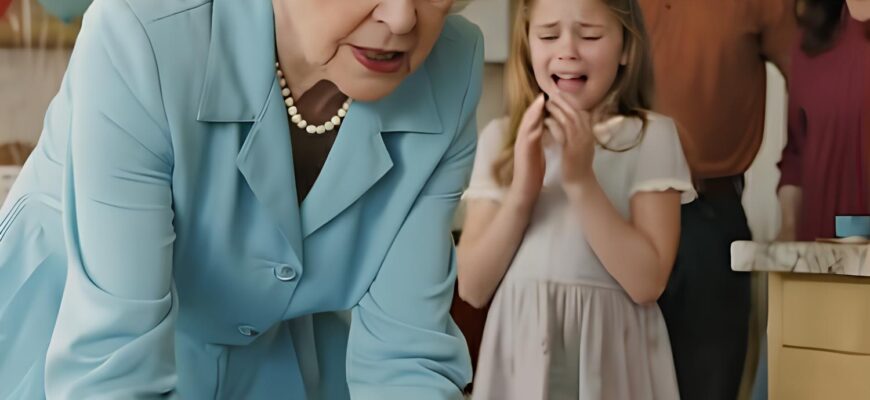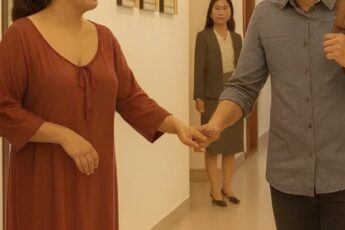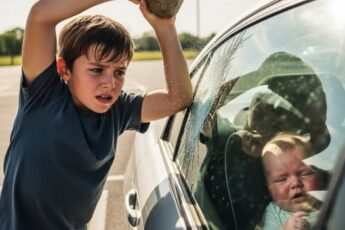My mother-in-law, Dolores, stood over the trash can, holding my daughter’s unicorn birthday cake as if it were contaminated garbage. The three-tiered vanilla cake, which I had spent hours decorating with buttercream roses and a fondant unicorn, was about to be met with coffee grounds and leftovers from the night before.
“She doesn’t deserve a party,” she exclaimed, her voice interrupting the “Happy Birthday” song we had sung seconds earlier.
My husband, Craig, just stood there, silent as ever, his hands frozen in the midst of the applause. Our daughter, Rosalie, watched her grandmother ruin the highlight of her special day. The other parents were stunned. The children fell silent.
But what happened next made Dolores wish she had never set foot in our house.
I’m Bethany, a 34-year-old elementary school teacher who thought I understood children. But that day, my own seven-year-old daughter showed me what true courage looks like. Rosalie is the kind of child who names her stuffed animals after Supreme Court justices and insists on reading the news with me. She notices everything while pretending to be completely absorbed in her coloring books. Craig, my husband, is a brilliant software developer, but he doesn’t handle confrontation well. He’s the kind of person who apologizes when someone else steps on his toe. That gentle nature made me fall in love with him, but it also meant he never stood up for the one who needed it most: his mother.
Dolores, 62, was a retired bank manager and a professional who put children at risk. In her world, children were to be seen, not heard, and certainly not celebrated unless they were earned through complete obedience. The birthday party was supposed to be simple. But Dolores always had other plans. What she didn’t know was that Rosalie had been working for weeks on what she called her “special project.” The moment Dolores threw the cake in the trash, I saw something change on Rosalie’s face. The tears were there, but behind them was something else. She wiped her eyes, went to her tablet, and said the words that would change everything.
“Grandma, I made a special video for you. Do you want to watch it?”
I should have known something was wrong when Dolores arrived with only her huge bags and that familiar look of disapproval. The morning had started so differently. Rosalie had come bounding into our bedroom at six in the morning, wearing the purple dress with the tiny silver stars she had chosen for her big day.
“Mom, do you think Grandma Dolores will like my surprise?” she asked, clutching her tablet to her chest. For the past month, she had been secretly working on what she called an “appreciation project” for school.
“I’m sure she will, honey,” I said, a hint of doubt in her words. Dolores had not liked anything we had done in the three years since we moved to Portland.
Our little craft house was a kaleidoscope of purples and pinks. Rosalie and I had spent three evenings cutting and folding paper butterflies, which we hung from the ceiling, where they cast dancing shadows on the walls. The centerpiece was the cake. I had stayed up until two in the morning, decorating buttercream roses and sculpting a fondant unicorn with a rainbow mane, just as Rosalie had designed it.
“Remember grandma who said unicorns were crazy and I was too old for them?” she asked me as we mixed the mixture. “I want another one. Maybe she’ll understand when she sees how beautiful it is.”
Craig was busy in the garage, avoiding party preparations. His weekly phone calls with his mother had become an exercise in distraction. “Mom is just being traditional,” he would say, rubbing his temples. “She means well.” But good intentions and doing good are two different things.
My sister, Naen, had FaceTimed and sung “Happy Birthday” from Chicago that morning after her flight was canceled. “Give Dolores the hell,” she whispered to me as Rosalie left.
“She’s Craig’s mother. I have to try,” I sighed.
“You’ve been trying for nine years, Beth. When will she try?”
The guests were deliberately limited: three kids from Rosalie’s new school and their parents. They were the ones who brought homemade cookies to parent-teacher conferences. I had everything neatly arranged. Even our ancient golden retriever, Biscuit, was wearing a festive bandana.
Craig finally emerged from the garage with a bag of ice. “He’ll find something,” he said, without looking at me.
“He always does that,” I replied, making Rosalie’s birthday crown. “But today is not about her.”
How wrong I was.
The misery began the moment Dolores entered. She examined the decorations with a tight lip. “And all this for a seven-year-old,” she declared. “That’s too much. Kids back when I was little were grateful for a simple cake and a family dinner.”
“Mom, please,” Craig muttered from behind his coffee mug.
Rosalie, who had carefully placed the party gifts, listened to every word. I saw her shoulders slump slightly. Then I saw Dolores’ special hat, which Rosalie herself had decorated with the words “The Best Grandma in the World” in silver glitter glue.

The other families arrived, and an uneasy calm descended on the house. Dolores sat in a corner chair like a queen guarding her yard, speaking to everyone within earshot.
“In my generation, kids played outside instead of staring at screens,” she announced as one of the children held up a pill.
“Sugar is poison to the developing mind,” she declared as a mother reached for a cupcake.
I found Craig in the kitchen. “Can you please talk to your mother? She’s making everyone uncomfortable.”
“She’s just being herself,” he said, and that was exactly the problem.
“Then be yourself and tell her to stop.”
Before she could answer, we heard Dolores’ voice from the other room. “Rosalie, stop! You walk like a regular street kid.”
I returned to find my daughter sitting up, her party crown askew. For an hour, we endured this awkward tension. The kids played games, each receiving a snide comment from Dolores. Then it was time for the cake.
I turn off the lights and carry her inside. The seven candles cast a warm glow on Rosalie’s waiting face. Everyone began to sing. Rosalie closed her eyes, ready to make her wish.
Then Dolores stood up. “Stop this nonsense now.” Her voice cut through the song like a knife. “That kid got an A on his spelling test last week. And he gets rewarded with this spectacle. That’s what’s wrong with your generation, Bethany. No consequences, just endless celebration of mediocrity.”
“Mom, that’s enough,” Craig said weakly. But his mother was already shaking.
“No, that’s not enough. Someone needs to teach this kid that rewards have to be earned.” Before anyone could react, she grabbed the entire cake. We all froze as she strode into the kitchen and held it over the trash can.
“She doesn’t deserve a party,” Dolores announced. Then she threw it.
The cake landed with a wet thud in the trash can. The unicorn’s head snapped off and the golden horn landed in a puddle of coffee grounds. The room was silent, except for Biscuit, who whimpered.
Craig froze, his mouth open and close like a fish. “Mom, that was… you shouldn’t have done that.”
“Someone had to be the adult here,” Dolores replied, wiping the imaginary crumbs from her hands. “When children fail, they suffer the consequences.”
I wanted to scream. I wanted to drag her out of my house. But then I saw Rosalie’s face. The tears that had been welling up in her eyes suddenly stopped. She wiped them away and smiled—a mischievous smile I knew all too well.
“Grandma Dolores,” she said, her voice surprisingly determined. “I understand you’re disappointed in me, but I made something special for you. Can I show it to you?”
Dolores said abruptly. “I think so.”
“It’s a video,” Rosalie said, running to her tablet. “I made it for school, but it’s really for you. I got an A.”
That caught Dolores’ attention. “A A? Why didn’t anyone mention it before?”
“Because it was a surprise,” Rosalie said, connecting the tablet to our smart TV. She stood next to the screen like a little presenter. “It’s called ‘The Important Women in My Life.’ You’re the star, Grandma.”
Dolores smoothed out her skirt and sat down on the couch, now the center of attention. “Maybe you all can learn something about good morals and values,” she announced to the other parents.
Rosalie pressed play. “I’ve found so much evidence,” she said, her eyes twinkling. “You’ll be surprised.”
The television screen came alive with cheerful music and a colorful title: The Important Women in My Life, by Rosalie Mitchell.
“The most important woman in my life is my grandmother Dolores,” Rosalie’s recorded voice began. Dolores boasted.
The first video clip played, vibrating and shot from the height of the tablet. The timestamp showed Thanksgiving. Dolores’s voice was crystal clear. “This kid is manipulative, just like his mother. He’s crying for attention. He’s pathetic.” The video showed Dolores talking on the phone, but in the reflection of a nearby dresser, Rosalie was visible on the couch, supposedly asleep, tears streaming down her face.
Dolores paled. “Where did you get that?”
The next clip was a FaceTime conversation over Christmas. “Craig married a younger man than him. Bethany can’t cook well and is raising a spoiled child. I’m too embarrassed to tell my friends.”
Another clip: Dolores at Rosalie’s school play. “No talent. Just like her mother. Rosalie will probably be average for the rest of her life, maybe even below average if she takes Bethany’s side.”
The clips kept coming. Dolores tells her hairdresser that Rosalie was “fat.” Dolores tells her sister that she was “trying” to get Craig to break up with me. But the worst part was the last one.
“I’m thinking about filing for divorce from Craig while Rosalie is still young enough to forget Bethany. Get full custody and start over with someone more suitable. This woman and her daughter are dragging him down. Rosalie will probably never amount to anything with those genes.”
The video then dropped on Rosalie at her desk. “My grandmother, Dolores, taught me that words can hurt more than falling off my bike,” she told the camera. “She taught me that bullies come in all shapes and sizes, even grandma-sized. And she taught me that evidence is important when you’re dealing with someone who’s lying about being nice.”
The video ended with the caption, “Evidence is important when you’re dealing with someone who’s lying about being nice.”
The video ended with the caption, “Evidence is for all the kids who have family members who pretend to love them but really don’t. You’re not alone, and it’s not your fault.”
The television went dark. The room was deathly silent.
Dolores grabbed her bag, her knuckles white. “This is an invasion of privacy! Craig, your daughter—!”
“My daughter,” Craig interrupted, his voice with a force I hadn’t heard in nine years, “just showed me how much of a coward I was.” Mom, you threw her birthday cake in the trash. You systematically tried to undermine my wife’s self-confidence and my daughter’s self-respect. You called my seven-year-old daughter a manipulative child. You said she had bad genes. You said you took her away from her mother. What kind of grandmother does that?
“Are you taking their side?” Dolores screamed.
“There are no sides, Mom. There’s only right and wrong. And that… that was wrong.”
Dolores rushed to the door. “You’re going to regret it! I’m going to make sure everyone knows what kind of child you’re raising!”
“Okay,” I said, finally finding my voice. “Tell them about the seven-year-old who stood up to a bully. I’m sure this story will end just the way you think.”
She slammed the door shut so hard that three paper butterflies fell from the ceiling. There was a moment of silence in the room. Then one of the kids started clapping. Soon everyone was clapping, and Rosalie took a little bow.
Twenty minutes later, we sang “Happy Birthday” again, this time with a store-bought chocolate cake that tasted like freedom. Craig held my hand and squeezed it as if apologizing for the years of silence.
Later, I found Rosalie in her room, writing in her journal. “Today I turned seven,” she wrote. “Grandma threw away my cake, but I got something better.” Dad finally stood up for us. He used his loud voice. Best birthday ever. Then, a postscript: PS. Mrs. Chen didn’t actually give me this assignment, but she told me to document bullying whenever I saw it. I think I captured it pretty well.
“Rosalie,” I asked, “how long have you been recording Grandma?”
“Since Christmas,” she said. “When she made you cry in the bathroom. I heard you, Mom. That’s when I started keeping evidence.”
Six months have passed. Dolores sent a letter from a lawyer, but our lawyer just laughed it off. Craig is now in therapy. He’s learning to use his voice, to set boundaries, to protect instead of just provide. Last week, he told his boss he wouldn’t be working weekends anymore. “My daughter is growing up fast,” he said. “I won’t miss her.”
Rosalie started a “Kindness Club” at school. And last week she asked me, “Mom, do you think I was mean to Grandma?”
“No, honey,” I told her. “You told the truth. That’s not bad. That’s brave.”
She smiled. “Maybe Grandma will apologize one day and we can try again.”
That’s how my daughter is. Even after everything, her heart remains open. She has taught us all that sometimes the smallest voices speak the loudest truths.






